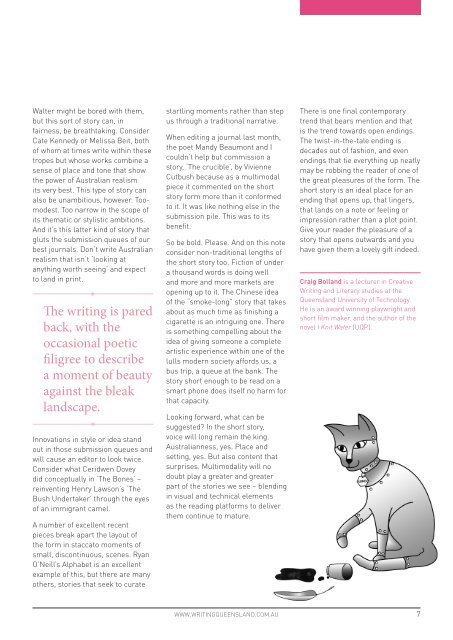Kristina Olsson
?r=MTAwMA0KDQoNCmM2ZDAwMDAwMDAwNjYwOQ0KaHR0cDovL3d3dy5xd2MuYXNuLmF1L2Fzc2V0cy9maWxlcy9XUU1hZ2F6aW5lL1dRJTIwSXNzdWUlMjAyNTUlMjAtJTIwZmluYWwucGRmDQp0cnVlDQptZWxpc3NhY3JhaWdhdXRob3JAZ21haWwuY29t
?r=MTAwMA0KDQoNCmM2ZDAwMDAwMDAwNjYwOQ0KaHR0cDovL3d3dy5xd2MuYXNuLmF1L2Fzc2V0cy9maWxlcy9XUU1hZ2F6aW5lL1dRJTIwSXNzdWUlMjAyNTUlMjAtJTIwZmluYWwucGRmDQp0cnVlDQptZWxpc3NhY3JhaWdhdXRob3JAZ21haWwuY29t
You also want an ePaper? Increase the reach of your titles
YUMPU automatically turns print PDFs into web optimized ePapers that Google loves.
Walter might be bored with them,<br />
but this sort of story can, in<br />
fairness, be breathtaking. Consider<br />
Cate Kennedy or Melissa Beit, both<br />
of whom at times write within these<br />
tropes but whose works combine a<br />
sense of place and tone that show<br />
the power of Australian realism<br />
its very best. This type of story can<br />
also be unambitious, however. Toomodest.<br />
Too narrow in the scope of<br />
its thematic or stylistic ambitions.<br />
And it’s this latter kind of story that<br />
gluts the submission queues of our<br />
best journals. Don’t write Australian<br />
realism that isn’t ‘looking at<br />
anything worth seeing’ and expect<br />
to land in print.<br />
The writing is pared<br />
back, with the<br />
occasional poetic<br />
filigree to describe<br />
a moment of beauty<br />
against the bleak<br />
landscape.<br />
Innovations in style or idea stand<br />
out in those submission queues and<br />
will cause an editor to look twice.<br />
Consider what Ceridwen Dovey<br />
did conceptually in ‘The Bones’ –<br />
reinventing Henry Lawson’s ‘The<br />
Bush Undertaker’ through the eyes<br />
of an immigrant camel.<br />
A number of excellent recent<br />
pieces break apart the layout of<br />
the form in staccato moments of<br />
small, discontinuous, scenes. Ryan<br />
O’Neill’s Alphabet is an excellent<br />
example of this, but there are many<br />
others, stories that seek to curate<br />
startling moments rather than step<br />
us through a traditional narrative.<br />
When editing a journal last month,<br />
the poet Mandy Beaumont and I<br />
couldn’t help but commission a<br />
story, ‘The crucible’, by Vivienne<br />
Cutbush because as a multimodal<br />
piece it commented on the short<br />
story form more than it conformed<br />
to it. It was like nothing else in the<br />
submission pile. This was to its<br />
benefit.<br />
So be bold. Please. And on this note<br />
consider non-traditional lengths of<br />
the short story too. Fiction of under<br />
a thousand words is doing well<br />
and more and more markets are<br />
opening up to it. The Chinese idea<br />
of the “smoke-long” story that takes<br />
about as much time as finishing a<br />
cigarette is an intriguing one. There<br />
is something compelling about the<br />
idea of giving someone a complete<br />
artistic experience within one of the<br />
lulls modern society affords us, a<br />
bus trip, a queue at the bank. The<br />
story short enough to be read on a<br />
smart phone does itself no harm for<br />
that capacity.<br />
Looking forward, what can be<br />
suggested? In the short story,<br />
voice will long remain the king.<br />
Australianness, yes. Place and<br />
setting, yes. But also content that<br />
surprises. Multimodality will no<br />
doubt play a greater and greater<br />
part of the stories we see – blending<br />
in visual and technical elements<br />
as the reading platforms to deliver<br />
them continue to mature.<br />
There is one final contemporary<br />
trend that bears mention and that<br />
is the trend towards open endings.<br />
The twist-in-the-tale ending is<br />
decades out of fashion, and even<br />
endings that tie everything up neatly<br />
may be robbing the reader of one of<br />
the great pleasures of the form. The<br />
short story is an ideal place for an<br />
ending that opens up, that lingers,<br />
that lands on a note or feeling or<br />
impression rather than a plot point.<br />
Give your reader the pleasure of a<br />
story that opens outwards and you<br />
have given them a lovely gift indeed.<br />
Craig Bolland is a lecturer in Creative<br />
Writing and Literary studies at the<br />
Queensland University of Technology.<br />
He is an award winning playwright and<br />
short film maker, and the author of the<br />
novel I Knit Water (UQP).<br />
WWW.WRITINGQUEENSLAND.COM.AU 7


